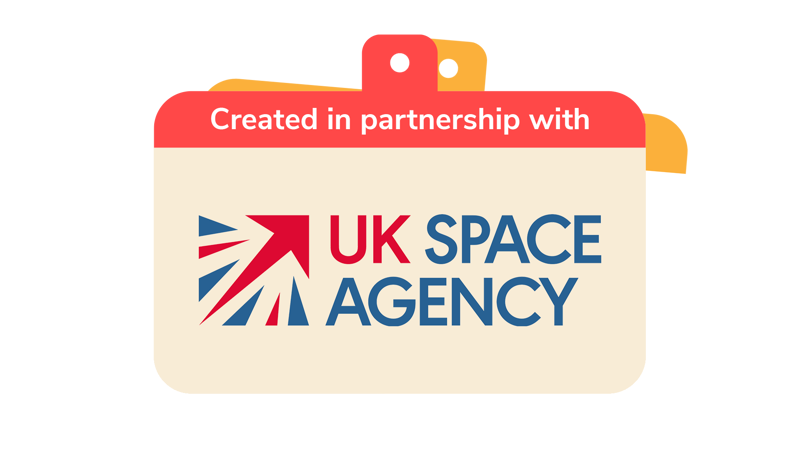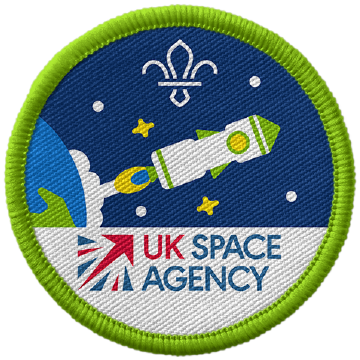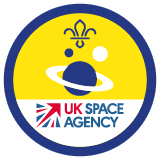
Play Space Explorers
You’ll need
- Chairs or cushions (optional)
Before you begin
- Use the safety checklist to help you plan and risk assess your activity. There's also more guidance to help you carry out your risk assessment, including examples. Don’t forget to make sure all young people and adults involved in the activity know how to take part safely.
- Make sure you’ll have enough adult helpers. You may need some parents and carers to help if you’re short on helpers.
Planning this activity
In this game, someone playing the Space Captain will need a special space to sit. This could be a chair, a cushion or a rocket shape drawn on the floor, such as with masking tape or chalk. Or, you could show everyone the space where your ‘rocket’ is by pretending to open the door and making sound effects.
Planets
- We live on a planet called Earth. Planets are very big and round objects, that travel around (or orbit) a star.
- Earth is part of a group of eight planets that travel around (or orbit) the Sun, which is our closest star. This group of planets is called the Solar System.
- There are eight planets in the Solar System. They are Mercury, Venus, Earth, Mars, Jupiter, Saturn, Uranus, and Neptune.
- Each planet is a different colour, size, and shape. Some are hot and some are cold. The biggest planet is Jupiter, and the smallest planet is Mercury.
- Earth is different to all the other planets in the Solar System because it's the only planet known to have plants, animals, and people living on it.
- Mercury, Venus and Mars are rocky planets like the Earth. The other planets (Jupiter, Saturn, Uranus and Neptune) are made of gases and liquids, so you wouldn’t be able to walk on them.
- Some planets have rings around them. The planet Saturn is famous for its big rings.
Stars
- Space contains lots of stars. You might see them at night when you look into the sky. Stars are made from hot gases, such as hydrogen and helium. There are hundreds of billions of other stars in space
- The closest star to Earth is the Sun. The Sun continuously produces energy in the form of light and heat. In fact, the temperature is around 14 million degrees at the centre of the Sun!
- Did you know that sometimes the stars appear to form patterns? A pattern made by stars is called a constellation. They can help people to know which way they’re going, such as finding which was North is.
The Moon
- Our closest neighbour is the Moon. The Moon is a big rock ball that spins around the Earth and the Sun. It’s not a planet.
- The Moon is much smaller than Earth. It's about one quarter of the size of Earth. Some other planets have moons too.
- We can often see the Moon clearly in the night sky. We can see the Moon because it reflects light from the sun.
- At times the Moon looks like a big circle, which is called a full moon. At other times it seems like the letter C or croissant-shaped and this is called crescent moon. As the Moon moves around the Earth different parts of it are lit, which is why it appears to change shape.
- Gravity is a special force that keeps things on Earth. The gravity on the Moon is just one-sixth of the Earth’s, so you would weigh less on the Moon. You could jump higher and carry much heavier things too!
Exploring space
- If we're going to explore space away from Earth, we must travel in a rocket.
- Special rockets that travel very fast are used to enter space. These rockets travel at approximately 25,000 miles per hour to enter space.
- People that train to travel into space on a rocket are called astronauts. We know lots more about space because of rockets and astronauts.
Exploring what we know about space
- Gather everyone together and tell everyone that you’re going to play a game called Space Explorers.
- Ask everyone what they know about space. What does everyone know about space? What might we see in space? You could talk about the Moon, Sun, stars, Earth, or even other planets. You could look at a book or photos to help. You can also find some information on this page.
- Explain that you’re going to pretend that you’ve blasted off into space in a rocket and you can see different space objects, such as stars and planets. You’ll need an action for each thing you can see.
- Everyone could work together to think of your own actions, or you could use the examples below:
-
- Earth: When space rocks come close to Earth at high speeds, they’re called meteors. Lie down as quickly as you can to avoid the meteors.
- Moon: Put on your moon boots and then do a moon walk. You’ll need to move around heavily and slowly, just like an astronaut.
- Sun: The sun is our closest star, so it looks really big. Stretch as wide as you can and open and close your hands to make them twinkle.
- Stars: All the stars that we can see (apart from our Sun) are so far away that they appear to us as perfect little dots. Make yourself as small as possible.
- Rocket: Reach up as high as you can, just like a rocket taking off.
- Saturn: Saturn is famous for the big rings we can see around it. Turn around in a circle.
- Neptune: Neptune is the furthest planet from the Sun and you need a telescope to see it. Telescopes allow us to look closer at distant objects. Pretend to use a telescope to look around.
- Make sure everyone knows the actions as well as they can before starting the game. You may want a volunteer or young leader to do the actions too for people to copy!
Playing the game
- Everyone should find a space and spread out around the playing area.
- One person should become the Space Captain. This could be a Scout, an adult volunteer or a young leader. They enter their ‘rocket’ and take the controls.
- Everyone else is an astronaut. The astronauts pretend to float around the room. For example, they could move around on tip toes with their arms stretched out.
- The Space Captain could shout out ‘3, 2, 1 to blast off to/by the…’ and chooses one of the actions. The astronauts all race to do action.
- If you wanted to play so that there’s a winner, then the last person to do the action could then be out. You could also split the group into two teams, with the last person in winning for their team and the ‘out’ astronauts could cheer on their teammates.
- If you don’t want to play competitively, after a few turns the Space Captain can then choose who will be the next Space Captain. It could be whoever did the action quickest or who did the most enthusiastic action.
Reflection
This activity was all about learning what’s in space. What can you remember about space? Did anything surprise you, or did you learn anything knew?
This game was all about remembering actions too. Did you come up with any actions? What was your favourite action? What was it like having to remember the actions? How did you remember them all?
In this game, we may have also been out. Sometimes it can feel sad or be hard to be out, but games are always more about having fun with friends than winning. How can we make each other and ourselves feel better if we were out? How can we make sure we try again next time? Did you cheer on your team or each other? It’s okay to be sad or upset if we’re out and we can say that to other people, but what shouldn’t we do if we’re out?
Safety
All activities must be safely managed. You must complete a thorough risk assessment and take appropriate steps to reduce risk. Use the safety checklist to help you plan and risk assess your activity. Always get approval for the activity, and have suitable supervision and an InTouch process.
- Active games
The game area should be free of hazards. Explain the rules of the game clearly and have a clear way to communicate that the game must stop when needed. Take a look at our guidance on running active games safely.
- To make this game easier, you could make have an adult volunteer or young leader joining in to remind people of the actions.
- To make this game harder, you could add more of the planets and actions as everyone becomes more confident.
- If anyone needs to, they could sit on a chair to do the actions.
- To make it easier, people could play the role of Space Captain in pairs.
- Take time and have patience while telling everyone what to do. Give short instructions clearly and concisely. If you need to, pause, then repeat the same instruction using the same words. You could have visual resources to explain the game or a printed copy of the instructions for anyone who may need them.
- You could have a practice round of the game to make sure everyone knows what they’re doing. Let young people help explain to each other what to do, too.
- Some people may find indoor or active games noisy, especially if the space echoes. You could have a noise level warning system to help everyone be reminded of the noise levels. The person could wear ear defenders, or you could run the game over a larger space to reduce the noise. Shutting doors and windows can help to reduce external sounds if you're indoors. You may wish to play this game outside.
All Scout activities should be inclusive and accessible.
You could learn more about the planets in our solar system by creating a fruit-salad solar system.
You should encourage the group to come up with their own actions for each space object. Can you think of an action for all eight planets? Or could you invent your own planets?

